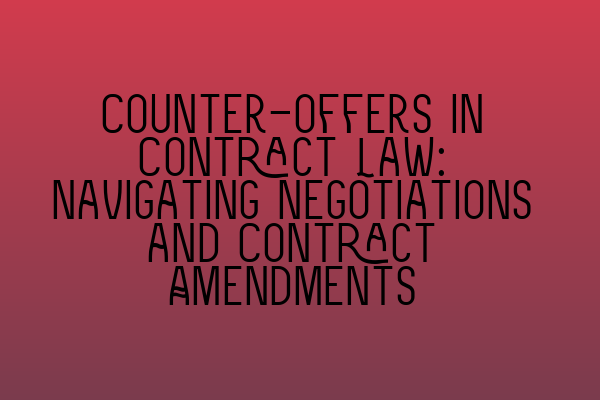Counter-offers in Contract Law: Navigating Negotiations and Contract Amendments
In the realm of contract law, negotiations play a crucial role in the formation of agreements. Parties involved in a contract often engage in a series of offers and counter-offers to arrive at mutually acceptable terms. Understanding the intricacies of counter-offers is essential for solicitors, as well as individuals navigating contract negotiations. In this blog post, we will delve into the world of counter-offers, exploring their legal implications, strategies for effective negotiations, and the importance of contract amendments. So, let’s dive in!
What is a Counter-offer?
A counter-offer is a response made by one party to the original offer put forward by the other party. It signifies the rejection of the initial offer and introduces new terms or conditions for the agreement. Essentially, a counter-offer is a form of negotiation that aims to find a middle ground between the original offer and the position of the party making the counter-offer.
Legal Implications of Counter-offers
When a counter-offer is made, it acts as a rejection of the original offer, terminating that offer and replacing it with the counter-offer. This means that the party making the counter-offer is no longer bound by the terms of the original offer. Instead, the offeree becomes the offeror, and the original offeror is now the offeree.
For a contract to be formed, there must be an acceptance of an offer without any modifications. Therefore, if the party receiving the counter-offer wishes to accept the new terms, they must communicate their acceptance to the party making the counter-offer. This creates a new offer and starts the negotiation process once again.
Navigating Negotiations with Counter-offers
Contract negotiations can be complex, and the presence of counter-offers adds another layer of intricacy. Solicitors and individuals engaged in negotiations must employ effective strategies to reach mutually beneficial agreements. Here are some key tips to navigate negotiations with counter-offers:
1. Clear Communication: Open and transparent communication is vital to understanding each party’s requirements and objectives. Clearly expressing your expectations and concerns can help facilitate productive negotiations.
2. Identifying Deal-Breakers: Identifying crucial aspects that are non-negotiable for each party helps streamline the negotiation process. By knowing what elements cannot be compromised, time and effort can be saved by focusing on other negotiable terms.
3. Creative Problem Solving: Instead of viewing counter-offers as roadblocks, approach them as opportunities for creative problem-solving. Look for win-win solutions that address the interests and concerns of both parties.
4. Seek Legal Advice: Engaging a solicitor with expertise in contract law can provide invaluable guidance throughout the negotiation process. A solicitor can help you understand your legal rights and obligations and ensure that your interests are protected.
Importance of Contract Amendments
Once negotiations have led to an agreement, it is essential to document any changes or modifications to the original terms through contract amendments. These amendments serve as formal records of the agreed-upon changes and provide legal clarity in case of future disputes. Contract amendments should clearly outline the revised terms, the parties involved, and the effective date of the amendment.
An accurate and comprehensive contract amendment can help avoid misunderstandings and potential disagreements down the line. It ensures that all parties are on the same page and understand their rights and obligations under the revised agreement.
Conclusion
Counter-offers are an integral part of contract negotiations, and understanding their legal implications is crucial for solicitors and individuals navigating contract law. By employing effective negotiation strategies, seeking legal advice when necessary, and documenting any changes through contract amendments, parties can reach mutually beneficial agreements while protecting their rights and interests.
If you’re preparing for the SQE exams and seeking additional study resources, consider checking out these related articles:
– SQE 1 Practice Exam Questions
– SQE 1 Practice Mocks FLK1 FLK2
– SQE 2 Preparation Courses
– SQE 1 Preparation Courses
– SRA SQE Exam Dates
These resources can provide valuable guidance and support in your journey to becoming a qualified solicitor. Good luck with your studies and future career in contract law!
